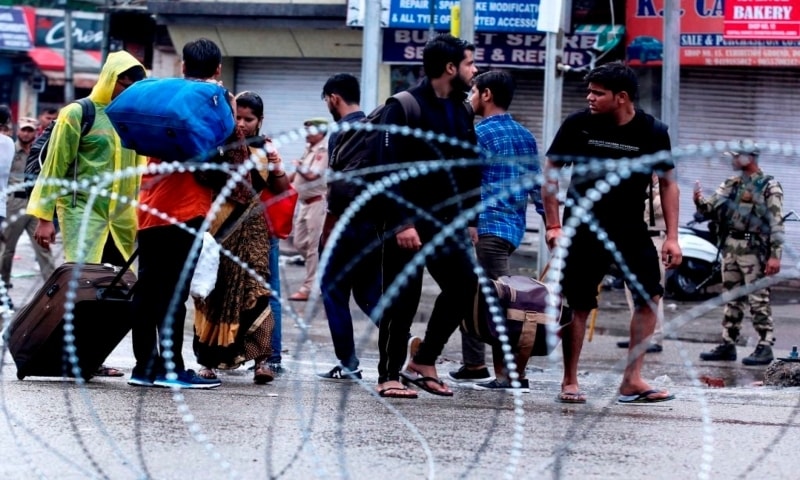SRINAGAR: For almost a century, no outsider was allowed to buy land and property in Indian-occupied Kashmir.
That changed on Aug 5 last year when India’s Hindu nationalist government led by Prime Minister Narendra Modi stripped the Himalayan state’s semi-autonomous powers and downgraded it to a federally governed territory. It also annulled the long-held hereditary special rights its natives had over the disputed region's land ownership and jobs.
Since then, India has brought in a slew of changes through new laws. They are often drafted by bureaucrats without any democratic bearings and much to the resentment and anger of the region's people, many of whom want independence from India or unification with Pakistan. A year later, things are swiftly changing on the ground.
Also read: With a heavy hand, India rides out occupied Kashmir's year of disquiet
Under a new law, authorities have begun issuing domicile certificates to Indians and non-residents, entitling them to residency rights and government jobs. Many Kashmiris view the move as the beginning of settler colonialism aimed at engineering a demographic change in India’s only Muslim-majority region.
Amid growing fears, experts are likening the new arrangement to the West Bank or Tibet, with settlers armed or civilian living in guarded compounds among disenfranchised locals. They say the changes will reduce the region to a colony.
Given the history of Indian state intervention in occupied Kashmir, there are efforts to destroy the local, distinctive cultural identity of Kashmiris and forcibly assimilate Kashmiri Muslims into a Hindu, Indian polity, said Saiba Varma, an assistant professor of cultural and medical anthropology at the University of California, San Diego.
Residency rights were introduced in 1927 by Kashmir's Hindu king, Hari Singh, to stop the influx of outsiders in the former princely state. Historians say the maharaja brought land ownership rights on the insistence of powerful Kashmiri Hindus. They continued under Indian rule after 1947, as part of Kashmir's special status.
The new law, introduced in May amid the coronavirus lockdown, makes it possible for any Indian national who has lived in the region for at least 15 years or has studied for seven years and taken certain exams to become a permanent resident in Jammu-Kashmir. The Indian government is ensuring the process is fast-tracked and has introduced a fine of 50,000 rupees ($670) to be deducted from the salary of any official in the territory who delays the process.
Those receiving domicile certificates include Hindu refugees from Pakistan following the 1947 bloody partition of the subcontinent, Gurkha soldiers from Nepal who had served in the Indian army, outside bureaucrats working in the region and some marginalised Hindu communities. Even the natives must apply for residency, otherwise they risk losing government jobs and welfare benefits.
About 400,000 people have been given domicile certificates in over a month, Pawan Kotwal, a top Indian official was quoted on Saturday by The Tribune, a north Indian English-daily. Officials have not said how many of them are locals and have generally been tight-lipped about the process.
Navin Kumar Choudhary, a senior bureaucrat from eastern Bihar state, was the first high-profile outsider to get residency on June 26. While Kashmiris were aghast as Choudhary’s picture displaying the certificate went viral on social media, many in Hindu-majority southern Jammu rejoiced.
Published in Dawn, August 5th, 2020



































